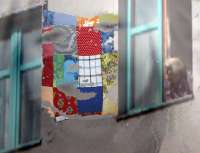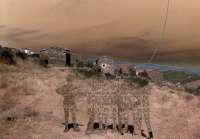BATIBURRILLO(S)
According to the Dictionary of the Royal Academy of Spanish Language (RAE) ‘Batiburrillo(s)’ means: 1. m. Mezcla de cosas, especialmente de guisados, que no dicen bien unas con otras. 1. m. Mixture of things, especially stews, that don’t go together well. 2. m. coloq. En la conversación y en los escritos, mezcla de cosas inconexas y que no vienen a propósito. 2. m. colloquial. In conversation and in writing, a mixture of things that are unrelated and don’t go together well.
BATIBURRILLOS
‘Batiburrillos’ is a collaborative project initiated by Spanish artists Laura F. Gibellini and David Maroto. ‘Batiburrillos’ could be roughly defined as a sort of cadavre exquis via email. Based in New York and Rotterdam respectively, they began to send each other both images and texts in order to make an extended art-work free from authorship conventions as well as from artistic and personal ego. The result is a number of pieces that combine image and text in a poetic manner, in which sometimes the later has bred the former and vice versa. The dynamics of this project are such that it is not possible to find recognizable traces of "I". Although as a starting point they opted for omitting all kind of conscious boundaries regarding themes and mediums, the progress of this project lead to unveil certain, unexpected connections between texts and images, different and dislocated timelines, as well as a reflection on the creative process (especially on the different levels of communication and understanding, personal memory, self-reflection and sensitivity). The project, conceived as a form of publication, remains unrealized.
Texts accompanying the pieces: 1985: “Quavering the chords strayed from the air, found it again, lost chord, and lost and found it faltering.” James Joyce, Ulysses. If a Man Has Lost a Leg or an Eye: “If a man has lost a leg or an eye, he knows he has lost a leg or an eye; but if he has lost a self -himself- he cannot know it, because he is not longer there to know it.” Oliver Sacks, The Man Who Mistook his Wife for a Hat.
BATIBURRILLO(S)
According to the Dictionary of the Royal Academy of Spanish Language (RAE) ‘Batiburrillo(s)’ means: 1. m. Mezcla de cosas, especialmente de guisados, que no dicen bien unas con otras. 1. m. Mixture of things, especially stews, that don’t go together well. 2. m. coloq. En la conversación y en los escritos, mezcla de cosas inconexas y que no vienen a propósito. 2. m. colloquial. In conversation and in writing, a mixture of things that are unrelated and don’t go together well.
BATIBURRILLOS
‘Batiburrillos’ is a collaborative project initiated by Spanish artists Laura F. Gibellini and David Maroto. ‘Batiburrillos’ could be roughly defined as a sort of cadavre exquis via email. Based in New York and Rotterdam respectively, they began to send each other both images and texts in order to make an extended art-work free from authorship conventions as well as from artistic and personal ego. The result is a number of pieces that combine image and text in a poetic manner, in which sometimes the later has bred the former and vice versa. The dynamics of this project are such that it is not possible to find recognizable traces of "I". Although as a starting point they opted for omitting all kind of conscious boundaries regarding themes and mediums, the progress of this project lead to unveil certain, unexpected connections between texts and images, different and dislocated timelines, as well as a reflection on the creative process (especially on the different levels of communication and understanding, personal memory, self-reflection and sensitivity). The project, conceived as a form of publication, remains unrealized.
Texts accompanying the pieces: 1985: “Quavering the chords strayed from the air, found it again, lost chord, and lost and found it faltering.” James Joyce, Ulysses. If a Man Has Lost a Leg or an Eye: “If a man has lost a leg or an eye, he knows he has lost a leg or an eye; but if he has lost a self -himself- he cannot know it, because he is not longer there to know it.” Oliver Sacks, The Man Who Mistook his Wife for a Hat.

